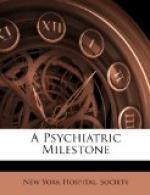It may be readily admitted that the behavior of those suffering from mental illness offends against conventional usages and is anti-social. It must also be recognized that amongst human beings living in aggregates some conventional usages must be evolved and insisted on in order to insure the greatest good of the greatest number. These usages are regarded not merely as protective measures for the body corporate, but they are also supposed to indicate a beneficial standard for the individual. But such a standard being adopted, observation is liable to be limited so much to results without sufficient attention being given to the causes which had led to those results.
By the recent advances in scientific knowledge and in methods of investigation we have been led to see that the conditions under consideration cannot be understood without a study of the mechanisms on which mental activity depends and without discovering the psychic and physical causes, arising from without and from within, which have disturbed the function of these mechanisms. We have learned that these illnesses do not arise from one cause alone and that they are the result of influences to which we all may be subject to some degree.
The originator of these modern methods, Prof. Freud, has stimulated us to regard the ordinary symptoms of mental illnesses as directing posts indicating lines to be investigated, and he and others have suggested various methods which may usefully be employed.
It is essential that we carefully distinguish what are primary from what are secondary symptoms. Two thousand years ago a physician, [Transcriber’s note: original reads ‘physican’] Areteus, pointed out that mania frequently commenced as melancholia, and he drew attention to the extreme frequency of an initial depression in cases of mental illnesses. But he did not offer any explanation of this initial state.
Such an initial state may perhaps be, to a certain extent, understood if we assume that the first evidences of mental disturbance consist in some difficulty in carrying out ordinary mental processes, some difficulty in exercise of the function of perceiving, thinking, feeling, judging, and acting, and that any disturbance of the harmonious activity of these functions must give rise to an emotional condition of anxiety and depression. Some such disharmony will, by adequate investigation, be found in a large number of cases to exist in the early states of the illness and will be appreciated by the patient before there occur any obvious signs, any outward manifestations of disability.




